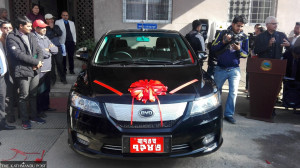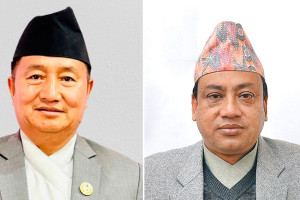Opinion
Modi’s Nepal agenda
If Modi can induce Nepal leaders to firm up a democratic, federal and Republican Constitution in the stipulated time, his visit will be a success
S D Muni
Nepal poses a real challenge to Prime Minister Modi’s neighbourhood vision and diplomacy. In Bhutan he had far less sensitive and controversial issues to confront, but Nepal is in a different mould.
In Nepal, there are a number of such issues including the revision of 1950 Treaty, disputes on border demarcation and border management, flow of
terrorists and fake Indian currency through Nepal, imbalanced trade and pending Nepali requests for transit and non-tarrif barriers, harnessing of Nepal’s hydropower potential and common water resources, funding Nepal’s developmental aspirations and facilitating Nepal’s transition into a federal, democratic Republic.
Most of these issues are mired into India’s bureaucratic mind-set and procedures, as also in Nepal’s penchant for distorting and politicising them. None of these issues are difficult to resolve but what vitiates them is the huge trust deficit built between India and Nepal over the past couple of decades and India’s failure to deliver fully and efficiently on the promises made. Modi’s aides and various governmental agencies must have been presenting copious briefs to him on how he should address these issues with his Nepali interlocutors.
Modi may be better advised to avoid getting into the nitty-gritty of these issues and instead take the bull of ‘trust and delivery deficit’ by horn. Bridging the trust deficit with Nepal and giving a clear and firm political direction for delivering on promises would make the best beginning for getting these issues duly resolved. Because if the core of trust deficit is not addressed then even agreements, including the one expected on power trade between the two countries, will not go very far.
There are several bilateral agreements, including the Mahakali Treaty and the one on Pancheswar multi-purpose hydro-power project, that remain dumped into diplomatic registers. Foreign Minister Sushma Swaraj’s visit to Nepal last month had infact made a right beginning in the direction of bridging the trust deficit. She promised Nepalese to review all bilateral agreements that have not moved on ground. She also promised to establish an India-Nepal Eminent Persons Group (EPG) to prepare a blue print for future cooperation and development between the two countries.
What Modi needs to do in Kathmandu is to give clear and powerful message that India is seriously and sincerely committed to reinforcing and expanding the unique relationship with Nepal. He should institutionalise the idea of EPG and make sure that the EPG is not stuffed by former diplomats and civil servants who, while in service, have made their respective contributions to box India-Nepal relationship into the frame that it is in today. Two sub-groups of EPG may be tasked to look specifically into the issues of hydro-power/water resource harnessing and border management that appear to be priority areas for the developmental visions of both India and Nepal. The EPG must work within a well-defined time frame and come with concrete action oriented recommendations. The Prime Ministers of both India and Nepal must commit their respective governments to be guided by these recommendations in their policies towards each other. Modi will also do well to assure his Nepalese counterparts that Indian officers and agencies will desist from attempting micro-management of Nepalese affairs and that the two governments will deal with each other at the highest political levels than being led by a diversity of stakeholders and vested interests that have been twisting and turning the bilateral relations.
Modi’s initiatives towards bridging the trust deficit with Nepal would depend a great deal on Nepal’s internal political stability and evolution. The principal question in this respect is of constitution making in Nepal. India must be creatively engaged in this process to the extent Nepal wants and welcomes, to ensure that Nepal soon gets a federal, democratic and Republican Constitution.
Modi has to guard against power lobbies within his own party who in league with their Nepali counterparts are trying to subvert the Constitutional process and asking for the revival of ‘Hindu Rastra’ and Monarchy in Nepal. Sushma’s dubious phrase of “durable democracy” rather than a “federal and democratic Republic” for Nepal has raised doubts about India’s commitment to the idea of a ‘New Nepal’. Heeding to these lobbies would amount to insulting the sacrifices made by the people of Nepal during the People’s Movement (Jan Andolan-II) of 2005-2006.
Nepal became a Hindu Rastra Constitutionally only in 1962, primarily to legitimize King Mahendra’s autocracy. Even without this constitutional provision, Nepal, like India, has been a predominately Hindu society and will remain so for ever. With the exception of two or three Kings, Monarchy does not have a glorious history in Nepal and since the death of King Tribhuwan in 1955, the Nepali Kings have done little to promote India’s genuine national interests. Monarchy’s contribution in nursing the anti-Indian streaks in Nepali nationalism since then has been rather notable. The Kings have used Nepal as a renter state to feed their personal glory and prosperity and have done precious little to improve the lives of their Nepali subjects.
If Prime Minister Modi can propose bold initiatives for bridging the trust deficit between India and Nepal and induce Nepal leaders to firm up a democratic, federal and Republican Constitution in the stipulated time, his visit would turn out to be a remarkable success.
Muni is Professor Emeritus, JNU, and Distinguished Fellow, IDSA




 26.7°C Kathmandu
26.7°C Kathmandu












